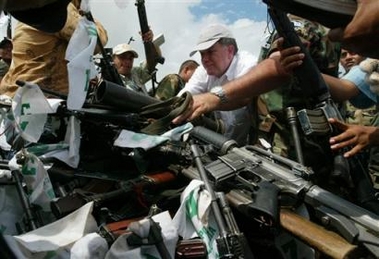|
Colombian fighters surrender arms, disband
(AP)
Updated: 2005-12-13 09:31
About 2,000 right-wing paramilitary fighters, including a warlord considered
a major drug trafficker by the United States, turned in weapons and helicopter
gunships Monday in one of Colombia's largest disarmament ceremonies in years.
In exchange for disbanding, the fighters from the outlawed United
Self-Defense Forces of Colombia, or AUC, were granted amnesty and will begin
receiving a monthly stipend of $180 from the government.
The camouflage-clad fighters filed past an outdoor stage and handed over
1,254 rifles to government officials at a heavily guarded ranch in the
northwest. They also surrendered 80 other guns, 526 grenades, 13 rockets and two
helicopter gunships, which were parked behind the demobilizing fighters.
Paramilitary factions have been disarming since 2003 as part of a peace deal
brokered by President Alvaro Uribe that aims to dissolve the AUC by next year.
The AUC once had 20,000 fighters but now has about 7,000.
Just as fighters from the AUC's Central Bolivar Bloc were turning in their
weapons, several people in the crowd fired gun into the air in celebration.
Organizers abruptly turned off the music blaring from loudspeakers and pleaded
with the fighters to behave.
"Please don't shoot any more! This is really dangerous!" one government
official said over the speakers in Otu, a cattle-ranching hamlet 160 miles north
of Bogota.
The Central Bolivar faction, one of the paramilitary units often accused of
having links to Colombia's drug trade, disbanded as part of a peace process that
human rights groups complain assures that those responsible for heinous crimes
will never be brought to justice.
The faction's commander, Carlos Jimenez, alias "Macaco," is on a 2004 U.S.
government list of top suspected drug traffickers, and he reportedly has close
links with the powerful Norte Del Valle cartel.

Colombian Peace Commissioner Luis Carlos
Restrepo, center, helps collect weapons into a pile during a ceremony in
Otu, in northwest Colombia, Monday, Dec. 12, 2005.
[AP] | "I ask forgiveness for all I might have
done to cause harm to Colombians," Jimenez told his men.
By demobilizing, paramilitary leaders are given sharply reduced prison
sentences for crimes they may have committed, including massacres of civilians.
Most of the rank-and-file are given a full pardon and can be eligible for job
training and a monthly stipend for two years.
The government says the agreement is helping to ease fighting that kills more
than 3,000 people a year.
Peace Commissioner Luis Carlos Restrepo shook hands with the paramilitary
fighters and called it an important day for Colombia, but added: "There is still
much to do."
He said at least five people dressed in civilian clothes were found dead in
the past week in the northern state of Cesar after fighting between leftist
rebels from the National Liberation Army and another paramilitary faction, the
Northern Bloc. Restrepo said the clash violates the cease-fire agreed to by
paramilitaries.
The army, meanwhile, reported a rebel from the National Liberation Army,
Colombia's second-largest guerrilla group, was killed and two captured in
fighting with troops late last week in the east-central state of Santander.
The handful of loosely aligned regional paramilitary groups emerged in the
1980s as an illegal force to attack leftist rebels battling the government for
more than four decades. They soon grew notorious, often massacring civilians
accused of sympathizing with the rebels.
"As long as citizens know that the taxes they pay are being reinvested into
the community, the guerrillas will never return," said Ernesto Baez, the top AUC
spokesman who was among those disarming.
"The AUC will not disappear from Colombia," but rather will become a
political force, Baez said, adding that he intends to seek public office.
Micheal Fruhling, a U.N. human rights official in Colombia, objected, saying
members of "movements that have committed serious violations of international
humanitarian law" should not participate in politics.
A total of 1,924 paramilitary fighters demobilized Monday, about four months
after 2,033 turned in their weapons at a ceremony that was the largest to date.
Colombia's main rebel group, the Revolutionary Armed Forces of Colombia, or
FARC, has shunned peace talks, but the smaller National Liberation Army, or ELN,
agreed to hold preliminary talks with Uribe's government later this week in
Cuba.
Colombia last held formal peace talks with the ELN in 2002 under
then-President Andres Pastrana. Those talks ended when Pastrana pulled out,
saying the ELN was not interested in peace.
|